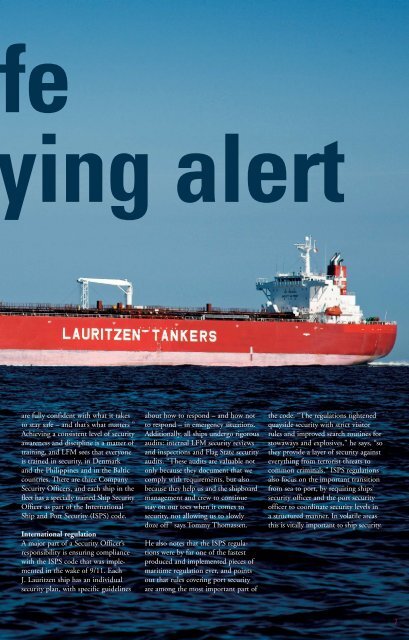Issue No. 7, September 2007 - J. Lauritzen
Issue No. 7, September 2007 - J. Lauritzen
Issue No. 7, September 2007 - J. Lauritzen
You also want an ePaper? Increase the reach of your titles
YUMPU automatically turns print PDFs into web optimized ePapers that Google loves.
e<br />
ing alert<br />
are fully confident with what it takes<br />
to stay safe – and that’s what matters ”<br />
Achieving a consistent level of security<br />
awareness and discipline is a matter of<br />
training, and LFM sees that everyone<br />
is trained in security, in Denmark<br />
and the Philippines and in the Baltic<br />
countries. There are three Company<br />
Security Officers, and each ship in the<br />
fleet has a specially trained Ship Security<br />
Officer as part of the International<br />
Ship and Port Security (ISPS) code.<br />
International regulation<br />
A major part of a Security Officer’s<br />
responsibility is ensuring compliance<br />
with the ISPS code that was implemented<br />
in the wake of 9/11. Each<br />
J. <strong>Lauritzen</strong> ship has an individual<br />
security plan, with specific guidelines<br />
about how to respond – and how not<br />
to respond – in emergency situations.<br />
Additionally, all ships undergo rigorous<br />
audits: internal LFM security reviews<br />
and inspections and Flag State security<br />
audits. “These audits are valuable not<br />
only because they document that we<br />
comply with requirements, but also<br />
because they help us and the shipboard<br />
management and crew to continue<br />
stay on our toes when it comes to<br />
security, not allowing us to slowly<br />
doze off” says Tommy Thomassen.<br />
He also notes that the ISPS regulations<br />
were by far one of the fastest<br />
produced and implemented pieces of<br />
maritime regulation ever, and points<br />
out that rules covering port security<br />
are among the most important part of<br />
the code. “The regulations tightened<br />
quayside security with strict visitor<br />
rules and improved search routines for<br />
stowaways and explosives,” he says, “so<br />
they provide a layer of security against<br />
everything from terrorist threats to<br />
common criminals.” ISPS regulations<br />
also focus on the important transition<br />
from sea to port, by requiring ships’<br />
security officer and the port security<br />
officer to coordinate security levels in<br />
a structured manner. In volatile areas<br />
this is vitally important to ship security.<br />
7



![41367 JL News 11 [6].indd - J. Lauritzen](https://img.yumpu.com/11983725/1/166x260/41367-jl-news-11-6indd-j-lauritzen.jpg?quality=85)

